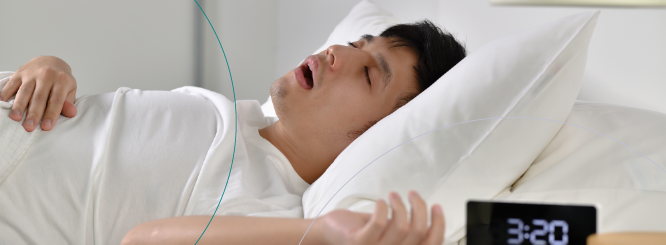
Have you ever wondered why some people snore while others don’t? Maybe you’ve noticed how some really struggle when it comes to snoring, but others don’t even bat an eyelash, literally, at the sound of their own harsh breathing. Everyone snores from time to time, some more loudly than others, and in this article we’ll explain some of the causes and how they can differ from men to women.
Snoring, while seemingly harmless, can be very uncomfortable and even become a chronic problem that’s indicative of a bigger, more serious underlying condition. If it’s starting to hinder your sleep patterns and overall health, make sure to contact your doctor so that they can examine you and order the appropriate tests. At LIMARP®, our multidisciplinary team is made up of specialists that can provide you with the help you need according to your symptoms. If the causes why you snore are related to weight issues, Dr. Liza María Pompa González will provide the necessary care and attention to find a solution that’s right for you.
We provide our patients with safe, effective and medically supervised weight loss options at our Tijuana clinic. Our Integrative Bariatric Program is customized to meet your individual needs and, as you go through it, you will learn about obesity and will acquire the tools needed for future prevention. Our multidisciplinary team also provides patients with solutions to improve both their physical and mental health for lasting results.
Before we continue on with the rest of the article, we’d like to remind you that the following information may not apply to your specific case and that you must seek professional help if you snoring or any other symptoms continue to aggravate.
It’s important that you be mindful of your health to be able to lead the lifestyle you want.
A Brief Overview on Snoring
Snoring is the hoarse or harsh sound that occurs when air flows past relaxed tissues in your throat, causing the tissues to vibrate as you breathe[1]. Almost everyone snores, some more loudly than others, but the loudness can sometimes be determined by the position one falls asleep in or their level of tiredness before going to bed; drinking alcohol can also make you snore because it relaxes your throat muscles, increasing the risk of snoring. Sleeping on your back may make you more likely to snore, as well as congestion from a cold or allergies can also cause you to snore[2].
In other cases, snoring can indicate other medical conditions, such as sleep apnea, a disorder that happens when your breathing stops and starts while you sleep. Another cause can include weight problems, since people who are struggling with obesity are more likely to have sleep apnea and/or snore with more frequency. If you’re experiencing any of the following symptoms, aside from uncomfortable snoring, you may want to speak to your doctor to confirm if you are dealing with sleep apnea:
- Difficulty concentrating
- Morning headaches
- Sore throat upon awakening
- Restless sleep
- Gasping or choking at night
- High blood pressure
- Chest pain at night
Snoring Differences Between Men and Women
Snoring is more common in men, though many women also snore, and it becomes more common as you get older. About 40% of adult men and 24% of adult women are habitual snorers, although men become less likely to snore after the age of 70. But what is the reason behind this? Well, it all has to do with the differences in anatomy between men and women. Both of them have areas behind their tongues called the oropharynx, which is located just above the larynx. As we have previously mentioned, the tissues at the back of your mouth relax and fall into this space when you sleep, which can lead to snoring. With men, the oropharynx is larger due to bigger upper airways and a lower larynx[3].
Also, men tend to have more fat in their chest and necks, which can press against the airways. This is also why people who are overweight or dealing with obesity tend to snore more, and this goes for both men and women.
The causes or reasons[4] why women may snore are the following:
- Weight gain: Women tend to gain weight due to hormonal imbalance, pregnancy, and menopause. As we have mentioned, this can add extra pressure to their airways and can cause loud snoring.
- Pregnancy: When a woman is pregnant, the blood vessels in their noses expand, causing them to snore more loudly and frequently.
- Exhaustion: Similar to men, extreme tiredness can also cause women to snore because the larynx gets very relaxed, causing the snoring effect or pattern.
- Menopause: Menopause can reduce muscle tone in the throat, causing women to snore. Also, during the perimenopause, a woman’s ovaries gradually reduce production of estrogen and progesterone, which can result in hot flashes, insomnia, mood disorders, and sleep-disordered breathing.
Other conditions that can cause snoring in both men and women are:
- Obesity: Excess fatty tissue can affect your airways.
- Obstructive sleep apnea: The soft tissues in the back of your throat collapse during sleep.
- Deviated septum: The strip that divides your nasal passages is off-center.
- Problematic uvula: This piece of tissue at the back of your mouth can be too big.
- Chronic nasal congestion
- Sleep position: Snoring occurs more in those who sleep on their backs.
- Nasal polyps: These are growths inside the nasal passageways.
If you’re experiencing any of these symptoms, make sure to contact your doctor as soon as possible. Snoring may only be indicative of an underlying medical condition that might require more observation in order to make a proper diagnosis. However, if you’re simply struggling to get a good night’s sleep due to loud or unmanageable snoring, there are some exercises and ways to reduce or eliminate snoring altogether.
How to Reduce Snoring
To determine the cause for your snoring, your doctor may request a series of tests that can include an X-ray, a computerized tomography scan or magnetic resonance imaging. A sleep test is also a viable option and it can be done at home or at a specialized clinic where they conduct a polysomnography. This test consists of being connected to sensors overnight so that the doctor can observe the following:
- Brain waves
- Blood oxygen level
- Heart rate
- Breathing rate
- Sleep stages
- Eye and leg movements
After the testing period, your doctor will be able to determine the best way to reduce your snoring. Some methods may include losing weight, avoiding alcohol close to bedtime, treating nasal congestion, avoiding sleep deprivation, and avoiding sleeping on your back. However, if your snoring is caused by sleep apnea or other condition, your doctor may suggest other alternatives to help reduce or eliminate the snoring.
First, they may suggest oral appliances, which are dental mouthpieces that help advance the position of your jaw, tongue, and soft palate to keep your air passage open[5]. You’ll also work with your sleep specialist to make sure the oral appliance is working as intended and may require dental visits to assess your oral health.
Other alternatives include the use of a CPAP, which involves wearing a mask over your nose or mouth while you sleep, directing pressurized air from a small bedside pump to your airway to keep it open during sleep. Upper airway surgery may also be an option and there are different procedures that can help tighten the throat tissue or altering the mouth’s anatomy so that air flows more smoothly when you’re asleep.
Contact Us to Learn More
If you’re struggling with snoring or having trouble breathing while you’re asleep, schedule an appointment with one of our doctors. We can help determine the right treatment for you. Contact us online anytime or give us a call at (619) 373-0229.
References
- [1, 5] “Snoring”. https://www.mayoclinic.org/diseases-conditions/snoring/symptoms-causes/syc-20377694. (Accessed December 26, 2022).
- [2] “Snoring”. https://sleepeducation.org/sleep-disorders/snoring/#what-is-snoring. (Accessed December 26, 2022).
- [3] “Why Are Men More Likely to Snore?”. https://www.houstonsinussurgery.com/blog/why-are-men-more-likely-to-snore. (Accessed December 26, 2022).
- [4] “Do Women Snore? 7 Scientifically Proven Ways to Prevent Snoring”. https://flo.health/menstrual-cycle/lifestyle/sleep/ways-to-prevent-snoring. (Accessed December 26, 2022).


